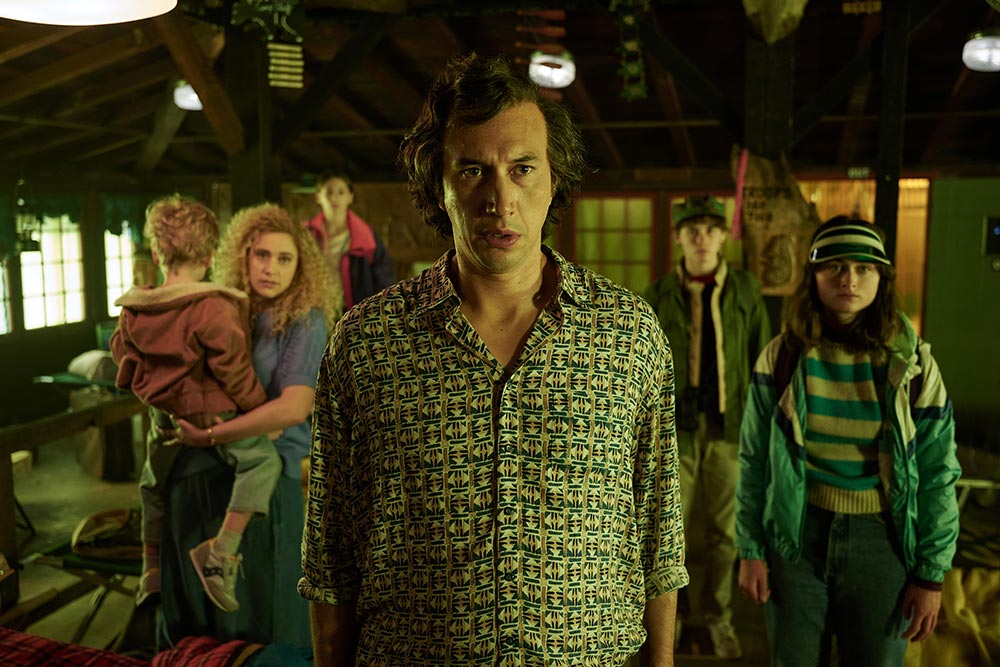The response to Noah Baumbach’s first literary adaptation, based on a novel whose reputation as “unfilmable” he often mentions, has been confused. Variety wonders, “Buzz is strangely muted for the first film ever to serve as the opening night movie of the Venice and New York Film Festivals. But why?” I think the answer has a lot to do with the discrepancy between expectations and results. Thanks to the gravitas lent to the project by source novel author Don DeLillo and stars Adam Driver, Greta Gerwig, and Don Cheadle—a roster that suggests a long-awaited Thanksgiving-weekend juggernaut with aspirations to awards and critical appreciation—the trivial end product comes as something of a surprise. Those who were expecting Inherent Vice (2014, to which White Noise has been compared) or even Cosmopolis (2012, the only other DeLillo novel adapted, boldly but questionably, as an English-language feature) are having feelings akin to those caused by unkept campaign promises. The adaptation’s shortcomings are not immediately obvious, so why the disappointment?
DeLillo’s novel has a verbosity bordering on preciousness, the prose of a man in love with his own wit. But, with that mysterious skill that talented writers often have, he makes this tension work to his advantage. We don’t begrudge him the long and pedantic dialogues about epistemological paradoxes; we feel inclined to humor him the way we humor a windbag professor emeritus who’s too eloquent to stay mad at. The novel’s prevailing tone is set by the acerbic observations about the essential phoniness of academia and the middle-class American family—a tone that, in the adaptation, cedes the stage to a certain kind of cutesiness, the characters’ irksome sophistry twisted into something charming. I don’t want to suggest that Baumbach missed something essential, but the fact that no effort has been made to translate to the screen the self-referential and self-deprecating satire of American intellectuals that is so key to DeLillo’s novel makes it feel like this party never really gets started.
Some of the most striking and challenging aspects of DeLillo’s novel are diluted or erased. In the book, the sound of the family’s television is ubiquitous, scenes randomly punctuated by non-sequiturs excerpted from infomercials and nature documentaries. Baumbach hints at this, but he could’ve taken a cue from Fassbinder’s The Third Generation (1979), in which TVs constantly blare in the background and drown out most of the dialogue. It’s hard to blame him for this, but Baumbach also circumvents some of the text’s deliberately uneasy racial dynamics. For example, the adaptation eliminates the character of Orest, Heinrich’s friend “of uncertain pigmentation.” From the novel: “I studied his features. He might have been Hispanic, Middle Eastern, Central Asian, a dark-skinned Eastern European, a light-skinned black. Did he have an accent? I wasn’t sure. Was he a Samoan, a native North American, a Sephardic Jew? It was getting hard to know what you couldn’t say to people.” And the character of Mr. Gray, the mysterious, motel-dwelling purveyor of Dylar, is white in the film, whereas in the novel his ethnic ambiguity is a source of great puzzlement to the narrator: “His nose was flat, his skin the color of a Planter’s peanut. What is the geography of a spoon-shaped face? Was he Melanesian, Polynesian, Indonesian, Nepalese, Surinamese, Dutch-Chinese?” Gladney’s preoccupation with ethnicity is uncomfortable, and it adds the nasty specificity of seeing the world through the eyes of a white academic—a Hitler scholar, no less—with little awareness of his privilege. Getting rid of this facet contributes to making the character too endearing.
The tone is off in several other ways. Instead of eerily hyperarticulate, everyone is precocious in a Royal Tenenbaums kind of way. Driver and Cheadle ham it up when they should be laconic. The whole thing is very theater kid, and this extends to the production design, which is stagey and twee. Where DeLillo’s approach to the airborne toxic event is indirect and understated, Baumbach leans into the spectacle and gives us a set-piece explosion and CGI toxic goo. The massive accident is also pinned on a hapless prole, a grizzled trucker who drops his bourbon at the wrong moment. Why did Baumbach particularize the novel’s oblique—and therefore far more menacing—treatment of this plot point? He seems to have wanted it epic and Spielbergian where it should have been banal, its causes a matter of provincial gossip and distorted by dumb speculation.
Although White Noise has now been filmed, it feels as unfilmable as ever. Maybe, like Little Women before it, DeLillo’s cryptic novel will require several adaptations before anyone cracks it. A challenge for Gerwig?



